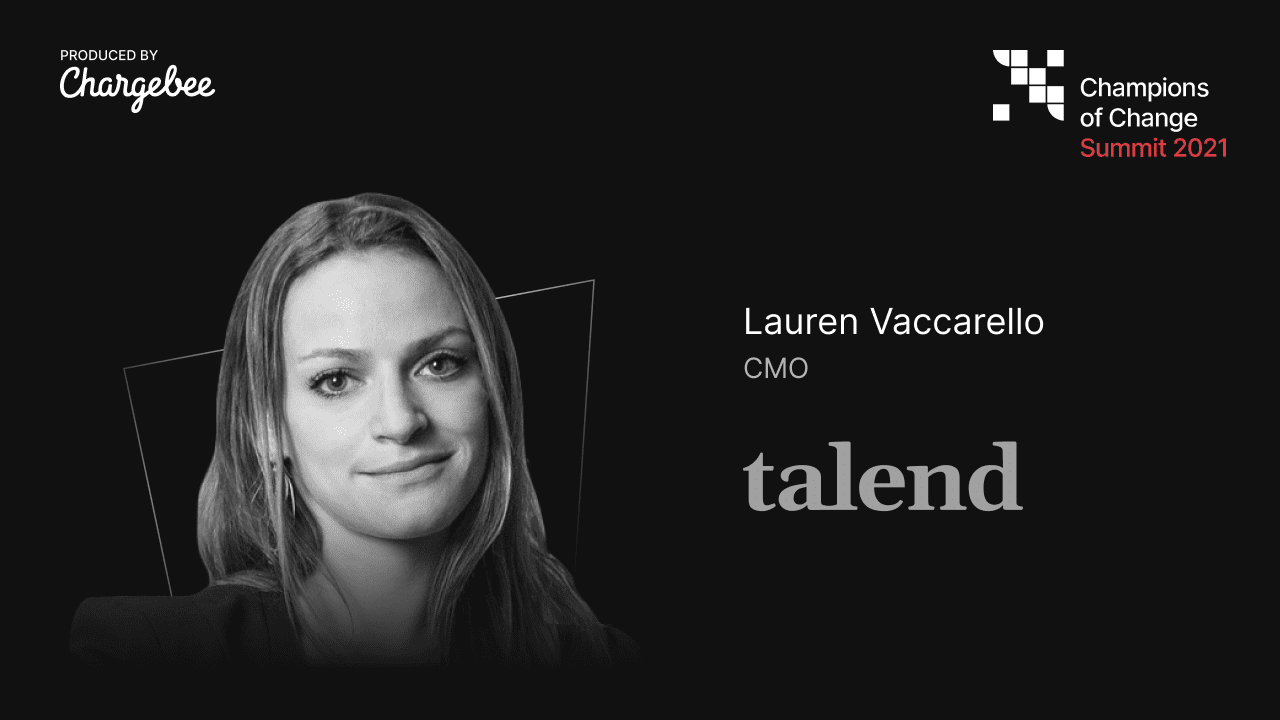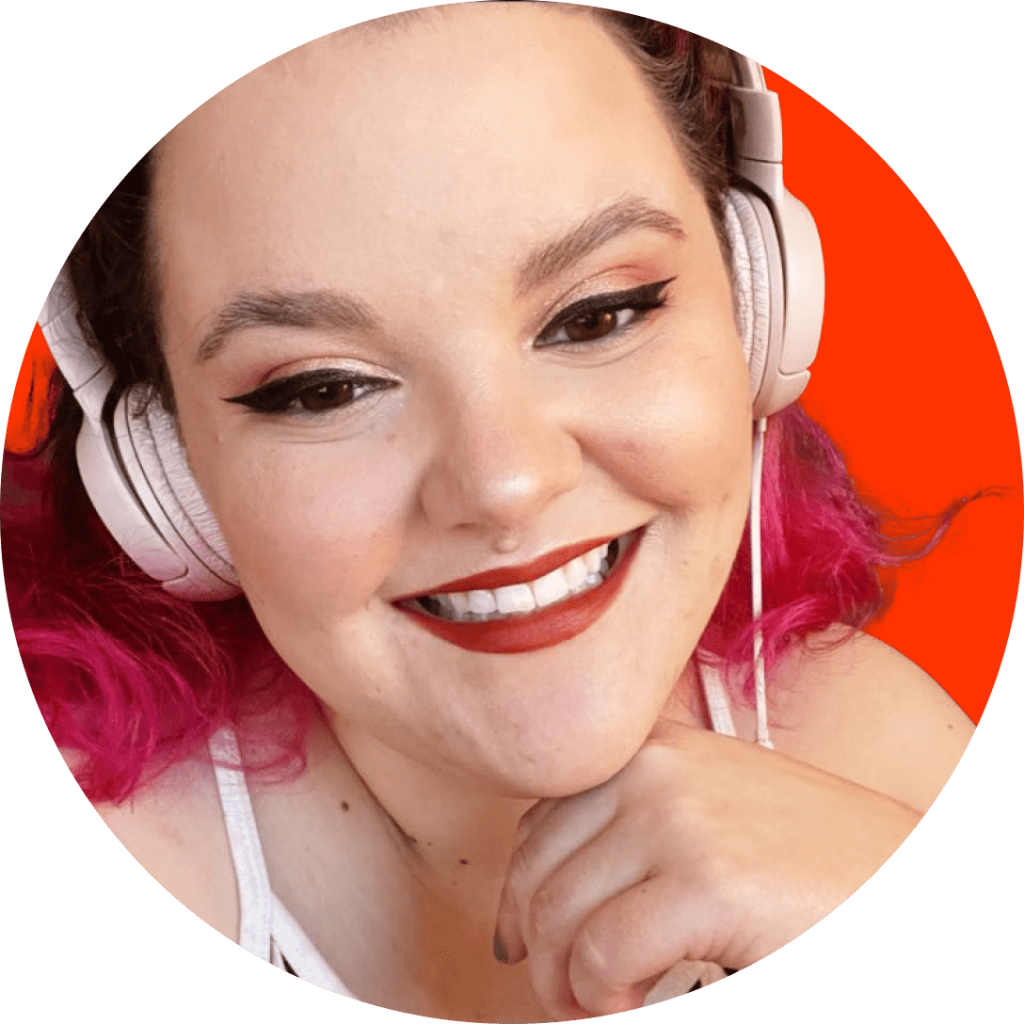How do you go from bartender to CMO? If anyone was going to do it, it was Lauren.
Change has been a constant in CMO at Talend, Lauren Vaccarello’s life since she graduated with her degree in marketing. Having worked as a bartender throughout college, when she moved back to New York, she had a choice: pick the path of least resistance and continue to look for bartending jobs (perhaps at New York’s famous Webster Hall, where she had put in an application) or move into an office job. With her paths set, Lauren let destiny decide with her, and she ended up with her first office job. In her own words: all of a sudden, the rest was history. Making such a massive shift from bartending to marketing may seem complicated. Still, Lauren could leverage the empathy she learned from her time as a bartender to inform her marketing decisions.
Lauren sat down with Chargebee’s CMO, Sanjay Manchanda, during our second Champions of Change summit to discuss how empathy has not only informed her marketing strategy and decision-making but how it’s helped her empower her team and create an encouraging environment where brilliance can blossom.

Bringing in Empathy During a Marketing Upheaval
“In bartending, how much money you make is directly tied to that human interaction. So, I got really good, really quickly, at “how do I understand somebody?” “how do I understand what matters to them?” “how do I understand how to relate to them?” said Vaccarello. “I didn’t realize how important those things would be for the rest of my career.”
That empathy helped her later in her career when she headed to Box – which was in the midst of a marketing change. The company was in high growth mode. Lauren noticed something right away that needed to be changed – the brand needed to mature to epitomize the trust and security the organization touted.
And once again, she was using these tools of empathy she’d cultivated to bring in the culture carriers to help define what they loved about Box, bringing employees along for the journey of change. This meant getting them on board and polishing their ideas — and of course, bringing the beer and pizza.
Even Talend, an all-in-one data integration and data integrity software with customers across many industries including, Lenovo and AB InBev, was surprised when the COVID-19 pandemic started to shut everything down (including Lauren’s favorite Milk Tea Bar, Boba Guys). The tools of empathy came into play when a campaign set to launch after the shutdown had begun in the U.S. (March 2020).
“I stopped everything, and I said: “This is tone-deaf. I can’t go to market with this. If I’m a customer, I’m right now. It’s March 2020, and all I’m thinking about is, can I keep this business going? What’s happening to my customers, to my employees. Am I going to be able to stay afloat?” I don’t care about anything else. We killed the entire campaign.”
Despite the initial backlash from her team, Lauren felt a breakthrough coming – for both her team and the brand team, which was insistent on using the old brand for the campaign. Lauren pushed back, and after an hour of meeting and working with the teams to meet their customers, they were emotional. Her persistence paid off only after realizing that she couldn’t force her employees to see her point of view, but she had to lead them there. She was able to do that and release a successful integrated marketing campaign in just two weeks that spoke to their customers in a way that fit the new world they were living in.
Building a Human Connection
“I’ve learned people will forget what you said, people will forget what you did, but people will never forget how you made them feel.” – Maya Angelou.
The pandemic sparked many business opportunities and a unique set of challenges – how can you drive change in a remote environment, and how can you keep people engaged and connected.
“We all work harder when we have a connection,” Lauren said. “We’re all Zoom fatigued, and if we can find a way to build that connection, make people engaged and excited to be there, it can help people build that bond and make them human.”
But beyond just the human connection, Lauren promotes the importance of a working environment rooted in psychological safety. Allowing employees to thrive on a high-performing team by building a culture of freedom, not fear, where taking risks is celebrated, and you’ve got to be okay with failure. The importance lies in creating an environment where people don’t censor themselves or ideas – not giving an employee the freedom to be a jerk – but to feel safe knowing they won’t be fired for having a bad idea. Creating space for employees to be themselves, cheer for their teammates, win, and fail, and for it all to be okay.
Lauren emphasizes that a considerable part of providing that safety should come from leadership who also have to ensure they remain authentic with their employees.
“For me, with empathy, it’s always showing up as authentic. We’ve all worked for leaders or worked with leaders who, when they ask you how you’re doing, or they ask you about your family, you can almost see on their face that they’re really not themselves,” Lauren said. “They’re almost forcing it, and it doesn’t come across as well. The first thing I’ll say is just the most authentic version of who you are. If you try to fake it, people will get it and will notice. Genuinely care about your employees, your colleagues, your customers, your partners, and show up like that.”
With a top-down approach, Lauren makes sure she infused her team with the same level of authenticity. Especially when there’s conflict on the team, she asked them to walk a mile in the colleague’s shoes they disagree with – once you’re about to see the other person’s perspective and the other side, the conflict tends to fizzle itself out.
Businesses Leading with Empathy
Thanks to that human connection, internal teams have been adapting, but how are some businesses making those connections? Lauren had a Talend customer in mind: high-end makeup and fragrance giant, Estée Lauder.
The company was working on a digital transformation before the COVID-19 pandemic, but the shutdown, the closing of malls and makeup counters worldwide accelerated their digital initiatives. Instead of letting go of talented makeup artists, Estée Lauder put them to work – virtually. They created an incredibly interactive program that let consumers still speak to a consultant instead of just dropping items into their cart and clicking the check out button.
“If the products people are buying are changing and we have this data, now, what are we doing to start switching this around, and how do we better personalize?” Lauren said. “I love how Estée Lauder was really able to accelerate business transformation.”
Change Based Around Empathy
For Lauren, the best advice is to approach people and situations with kindness and not anger. She admitted, a lot of it was rooted in the work she’s been doing in meditation, but, especially in these times, Lauren prompted us to lead with kindness, sincerity, and authenticity.
Be sure to check out the rest of our session recaps on the blog and, don’t forget to check out our Champions of Change Podcast! It’s hosted by Chargebee’s Senior Direct of Marketing, Vikram Bhaskaran. The first episode is fantastic, so be sure to listen and subscribe!





